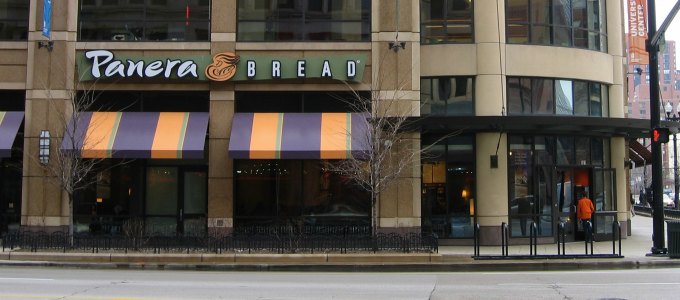Panera now has 2,000 storefronts across the U.S. and Canada, while its original parent company only has 300 worldwide. (Image courtesy of Wikimedia Commons.)
For Panera Bread Co.’s CEO, it’s all about making bread — and not just the kind baked in its ovens.
Of course, wanting to make money and compete doesn’t separate Ron Shaich from other CEOs. But what might make him a bit more interesting is his main philosophy about how to keep the competitive edge his company needs. Hint: It’s not making sure the bagels are fresh every morning. (Although who doesn’t enjoy a warm cinnamon crunch carb-bomb every once in a while?)
“I view my role as CEO as protecting those that discover ways to build competitive advantage," Shaich told Business Insider. "Our job as leadership is to protect and enable leaps of faith, making sure the company is there when the future arrives.”
Panera’s future looks pretty bright, especially when it’s currently worth $4.5 billion. Its original parent company, Au Bon Pain, is now a competitor that has 300 worldwide locations compared to Panera’s 2,000. Splitting from the bigger name was one of Shaich’s first crazy ideas that helped propel his company forward.
That’s the most important aspect of Shaich’s talent philosophy. To him, the new entrepreneur is a “Discovery Person,” someone who creates a new way of doing things. But as companies grow, Discovery People become Delivery People who don’t budge from their tried-and-true methods and eventually lose the competitive edge that made them successful.
Shaich has tried to remain a “Discovery” person and surrounds himself with likeminded thinkers. But from a management perspective, that means that he has to embrace even the craziest ideas. When someone said “Let’s open up pay-what-you-can restaurants,” he not only defended the idea but also researched and executed it. OK, so it didn’t work the way it was supposed to — but it did show that he’s not afraid of unorthodox thinking.
Panera Cares Cafes, pay-what-you-can bakeries, ultimately didn’t work but did help the company’s philanthropic image — a huge competitive edge when it comes to Gen Y’s love of greater-good shopping.
Not to ignore consumers’ tech tastes, Panera has also introduced some of the more innovative technology into its stores. It was one of the first retailers to integrate Apple Pay into their stores in October 2014 — months before the method started booming at other places. Imagine that board meeting: “There’s this thing where people can pay with just their mobile phones, and no one else is doing it.” Shaich took the risk by investing time in someone’s oddball idea and is now reaping the rewards.
After four years of development, the restaurant is also launching Panera 2.0, which allows customers to come in, sit down and order and pay using their phone. The program embraces technology in a way that will probably inspire other eateries to do the same if it works, and chances are it will definitely give the company a competitive edge while the rest catch up. If it doesn’t work, they’ll go back to the drawing board for the next plan.
Talent managers take note: Many CEOs don’t think the way Shaich does, so it’s up to you to take his approach. Embrace the innovative and protect even the most unpopular ideas — they might make all the difference to the change and profit your company is trying to bake up.















